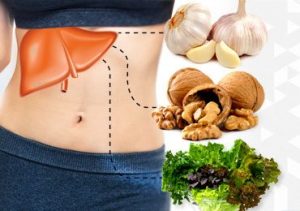Liver : An Important Organ in Your Body
The liver is an internal organ of our body that converts food into energy. Although the stomach breaks down the food into its various nutrients, the liver does the actual work of converting these nutrients into usable chemicals that can be absorbed by the blood to be useful to the other body organs.
The liver, situated on the right side of the belly, is protected by the ribcage. It detoxifies the blood in the body clear poisons from any ingested food or drink. It is responsible for the metabolic rate of the body. It stores extra energy for the body to use at a later time. It also makes important proteins that enable the clotting of blood in the case of injury.
Types of Liver Diseases
The liver acts as a filter of the body that ensures all harmful contagions are kept out of the circulation system in the body. However, if the liver is not functioning properly it may result in many serious diseases as well as disorders.
The most common diseases that occur due to the malfunctioning of the liver are:
- Hepatitis: There are many types of hepatitis, namely hepatitis A, hepatitis b, hepatitis c, hepatitis d, and hepatitis e. this disease is caused by the inflammation of the liver cells caused by the presence of a virus called viral hepatitis. Hepatitis is a highly communicable disease, which spreads through the exchange of any type of body fluid.(WHO)
- Fatty Liver Disease (FLD): A person is said to have a fatty liver when fat builds up on the liver. The fatty liver disease has two categories, namely alcoholic fatty liver disease and nonalcoholic fatty liver disease. Excessive consumption of alcohol results in the production of harmful chemicals in the liver, this results in Alcoholic FLD. The Nonalcoholic FLD is not related to the consumption of alcohol. The disease causes inflammation in the liver cells. In advances stages, this disease progresses into fibrosis or scarring(U.S. National Library of Medicine).
- Autoimmune Disease: The autoimmune disease that affects the liver is called Autoimmune Liver Disease. The body’s immunity system starts to attack the liver and results in liver inflammation. This disease is a major cause of concern among women.
- Cancer: The growth of unhealthy cells in the liver results in cancer formation. This cancerous growth can start from the liver organ itself, which is known as primary liver cancer, and can spread from another cancerous organ in the body, which is known as metastatic cancer. Although cancer can be treated, there are no vaccinations against it.
- Liver Cirrhosis: Hepatitis C, Hepatitis B, and Alcohol-related liver disease are a few common causes of liver cirrhosis. When the healthy liver tissues are replaced by non-living scar tissue, it is called as liver cirrhosis.
- Jaundice: Jaundice is a liver condition that stems from an increase in the bilirubin count of the body. The bilirubin count reflects the amount of bilirubin (a waste material) is circulating in the body. This buildup can cause inflammation of the liver and blocking of the bile ducts in the body. Jaundice occurs due to an underlying malfunction in the body. The treatment of jaundice involves identifying and curing the underlying body disorder.
How to Keep Liver Healthy?
Most people are born with a healthy body and that includes a healthy liver. Liver health can be maintained throughout the course of life by ensuring a few important factors are fulfilled. These factors are everyday lifestyle changes that influence the way your body interacts with the surrounding environment. Let us look at a few things that will help to keep our liver healthy:
- Maintain body weight is a simple way to ensure liver health. Sudden gain or loss of weight in a body can lead to a disturbance in its inner working. The ideal way to look at maintaining body weight is to manage to stick as close to the BMI of 24, this ensures that your body does not have to deal with excess weight, excess fat, imbalanced metabolic system, etc.
- Having a balanced daily diet can be beneficial to the liver. A balanced diet excludes high-fat consumption (specifically saturated fats), excessive red meat consumption, etc. and includes drinking of lots of water (usually 3 liters of water for an average adult), ensuring a high fiber content in meals, and the consumption of low-fat dairy.
- Ensuring regular exercise leads to the burning of triglycerides that were consumed by us in our food. The average human needs a minimum of 30 minutes of exercise; this can be in the form of walking, running, dancing, etc. The main objective is to increase the heart rate and sweating and ensure that the body starts to breakdown the available triglycerides.
- Inhalation of toxins from aerosols, paint fumes, etc. can lead to an increase in the toxicity in the body. This increased toxicity can be detrimental to body and liver health. Therefore, exposure to such toxic fumes is advised against.
- To prevent scarring of liver it recommended that consumption of alcohol should be in controlled quantity. Alcohol has a direct effect on our body and it is the primary cause for a number of liver diseases.
- Avoiding drug abuse is a good way to keep our liver healthy. Illegal chemicals can harm our body in unforeseen ways. Moreover, the overuse of safe drugs, like anti-inflammatory drugs, can also lead to the presence of excessive chemicals in our blood that leads to a chemical imbalance in the body that may lead to liver damage.
- Practicing safe personal hygiene is a good way to avoid exposure to many communicable diseases, including AIDS, Hepatitis A, etc. Regular washing of hands, taking regular baths, avoidance in sharing of items of personal hygiene (towel, toothbrush, soap, etc.), using clean clothes, and eating food from healthy sources, etc. are a few ways to practice good hygiene.
- Practicing safe sex helps in avoiding unnecessary exposure to the virus that may lead to Hepatitis C and Hepatitis B diseases. These diseases are often transmitted through the exchange of body fluids. Use of condoms and knowing your partner’s medical history is effective ways to decrease exposure to these viral diseases
- Timely vaccination for Hepatitis A and Hepatitis B can ensure protection against accidental exposure to the same.
What Foods Help us Keep Our Liver Healthy?
Now we know the ways to keep our liver and us healthy. Let us look at a few foods that boost liver health:
- Coffee : Drinking one cup of coffee in the morning is a good way to jumpstart your day. It is also an efficient way to ensure good liver health. The anti-inflammatory and antioxidant properties of coffee ensure the neutralization of free radicals present in the system, preventing liver cell damage in the body.
- Tea : Drinking tea in the morning is another effective way to prevent damage to the liver. Drinking black or herbal tea results in detoxification of the liver. There is a significant change in the blood markers in the body on the consumption of 5-6 cups of tea every day.
- Green Tea : A Japanese study has proclaimed that drinking green tea helps patients with Non-alcoholic Liver Disease. The anti-oxidant and anti-inflammatory properties of green tea improve the liver enzyme levels in the body.
- Grapefruit : Grapefruit is said to be rich in natural antioxidants that protect the liver. The main antioxidants found in grapefruit are naringenin and naringin. They help in ensuring decreased damage to the liver cells.
- Cranberry : Cranberry is purported to be a member of the super-food category; it has sufficient levels of anti-oxidants that ensure increased liver health. Cranberry can be consumed as a fruit or as juice; both ways help the body to deal with free radicals and decrease cell damage in the body. It also helps in metabolizing fats and reduces bile production in the liver.
- Grapes : The consumption of grapes and grape seed extracts is an effective remedy against liver disorders. The anti-inflammatory property of grapes protects the liver from damage and the anti-inflammatory property prevents swelling and tenderness in the liver. These properties are helpful in fighting all kinds of infections in the liver; thereby, decreasing the chance of liver disease.
- Cruciferous Vegetables : Vegetables like sprouts, broccoli, cauliflower, and mustard greens, etc. are known as cruciferous vegetables. These vegetables are high in fiber content, which is good for ensuring a balanced diet and a healthy bowel movement. These vegetables have a distinctive taste, as they are high in beneficial plant compounds, which ensure proper liver function.
- Nuts : The nuts like almond, chew, walnut, hazelnut, etc. are a popular category of super-food. They are rich in micronutrients that help in maintaining a balance in body hormones that govern the functioning of the body organs. They also regulate the working of the liver and ensure its proper health.
- Fatty Fish : Fatty fish and seafood help in ensuring the proper functioning of the liver. These foods are rich in micronutrient content and are rich in ‘good’ fats, i.e. omega3 and omega6 fatty acids. They help in metabolizing fat and insulin in the body. This decreases the fat deposition on the liver and improves health.
- Olive Oil : Oils that are rich in Vitamin C are healthy for the liver. Olive oil is especially rich in monosaturated fats and Vitamin C. Olive oil consumption helps in detoxification of enzymes, increases in metabolic activity in the body, and improves insulin sensitivity of the body. All these properties ensure heart and liver health as well as improved metabolic rate in the body.
Frequently Asked Questions About Liver Health
1. What are the symptoms of liver damage?
Ans : Liver damage usually goes unnoticed in the initial stages, as the disorder or disease progresses to more serious stages the following symptoms may emerge in an individual –
- yellow skin and eyes
- dark yellow or orange-tinged urine
- pale, bloody, or black stool
- swollen ankles, legs, or abdomen
- nausea
- vomiting
- decreased appetite
- fatigue
- itchy skin
- bruising easily
2. Is liver disease hereditary?
Ans : Yes. Although most liver diseases are caused by improper diet and lifestyle, some liver diseases are caused by inherent body disorders that can be hereditary in nature. Here are a few liver diseases that may be hereditary:
Hemochromatosis is a condition of the body that leads to excessive storage of iron in the body. This excess iron remains in the body organs, including the liver. This condition can lead to severe liver damage if it is not monitored and managed.
Wilson’s disease is a condition when the liver absorbs copper instead of releasing it into the bile ducts. This may lead to liver damaged due to the storage of copper in the liver and allowing this copper to enter the bloodstream to damage other body parts, including your brain.
Alpha-1 antitrypsin (AT) deficiency is a liver condition where it does not produce sufficient levels of alpha-1 antitrypsin, a protein that helps prevent enzyme breakdowns throughout your body. This condition can lead to liver disease.
3. Can drinking alcohol damage the liver?
Ans : No. Consuming alcohol in controlled quantities does not damage the liver organ. However, excessive alcohol consumption can effectively lead to fatty deposits on the body. Consequently, it can cause disease and damage to the liver. Therefore, regulated alcohol consumption is advised.
Conclusion
The liver is an important organ of the body. The liver is said to perform over 400 operations in the day. A healthy liver regulates all the important organ function, body metabolism, body weight, and body purification processes. Most liver diseases are a function of an unhealthy diet or bad lifestyle choices. Ensure liver health by proper diet, regular exercise, and healthy lifestyle choices to live a long and healthy life.


















thanks for this amazing article.